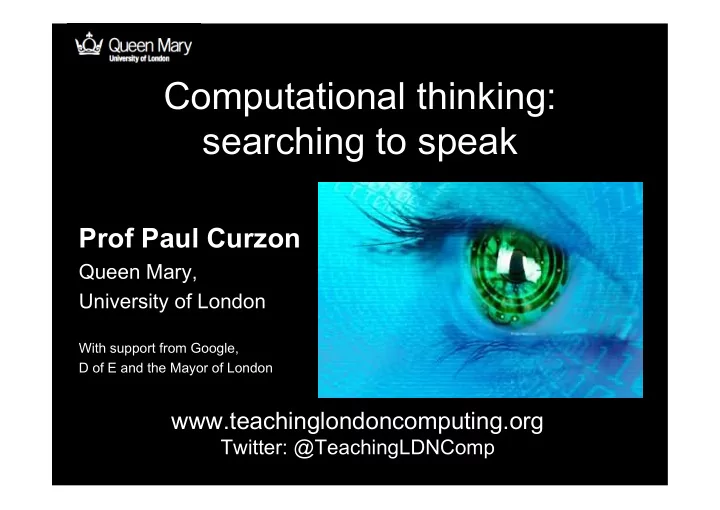

Computational thinking: searching to speak Prof Paul Curzon Queen Mary, University of London With support from Google, D of E and the Mayor of London www.teachinglondoncomputing.org Twitter: @TeachingLDNComp @TeachingLDNComp Twitter:
Aims • Give you deeper understanding of core topics – What is computational thinking? – Search Algorithms – Comparing algorithms – Computing is not just about computers! • Give you some practical ways that computing can be taught in a fun, thought provoking way – away from a computer • Linked activity sheets can be downloaded from our website: www.teachinglondoncomputing.org
Locked-in Syndrome • A person with locked-in syndrome is totally paralyzed except perhaps being able to move an eyelid. • They can see, hear and think but they cannot communicate back. • Their intelligent mind is trapped inside a useless body.
Could you write a book if you had locked-in syndrome? • Jean-Dominique Bauby did… – “one of the greatest books of the century”. • Describing his life with locked-in syndrome. • How did he do it? – With a helper – No technology
Communicating with Locked-in Syndrome • The helper reads the alphabet a letter at a time – Is it A? – Is it B? – Is it C? etc • Blinking means yes, not blinking means no • The helper writes the letter down. • Then starts again with the next letter
How well does it work? • Try it… • What problems need to be solved? – to make it really work • Can it be improved? • How fast is it? – How long would it take to write a book?
How fast is it? • It is very slow • It takes on average 13 questions for every letter • At worst it takes 26 questions • In identifying problems, coming up with solutions and faster ways, you are doing computational thinking!
Computer Scientists do it better • Any Computer Scientist knows it can be done in… 5 questions per letter at worst How?
Let’s play a game • 20 Questions… • I think of a famous person. • You have to guess who I am thinking of by asking questions. • I can only answer yes or no.
Winning at 20-Questions • Do you ask questions like – Is it Adele? – Is it Gandhi? – Is it Usain Bolt? • That takes millions of questions – you have only 20! • Instead you try to ask halving questions… – Are they female? • Apply that solution to Locked-in communication
Search Algorithms • We have looked at two different ways of searching for information • Two different algorithms – Linear search • One by one – Binary search • Divide and conquer • Halving search
Does everyone agree we would have improved things for Bauby?
Did we get it right? • Did we count the right thing? • What if blinking is hard work for him? – We should have found out first. • Have we made his life better or worse? Computing is about understanding people too.
What is computational thinking? • Computing is about thinking skills – Algorithmic thinking – Abstraction – Translating solutions – Generalisation – Analytical thinking – Understanding people • Not just about computers! – Solutions for people Activity sheets at www.teachinglondoncomputing.org Twitter: @TeachingLDNComp @TeachingLDNComp Twitter:
Thank you! On our website to support this session: • Activity sheets • Story sheets • Slides Details of more worskshops/courses • free unplugged sessions • subsidised courses (e.g. GCSE programming) www.teachinglondoncomputing.org Twitter: @TeachingLDNComp @TeachingLDNComp Twitter:
Recommend
More recommend